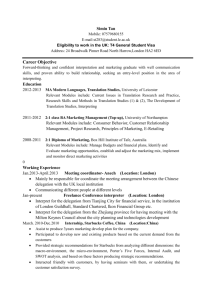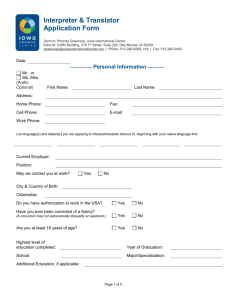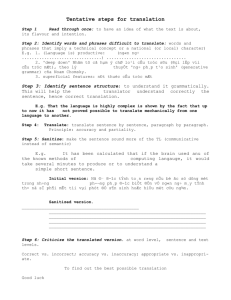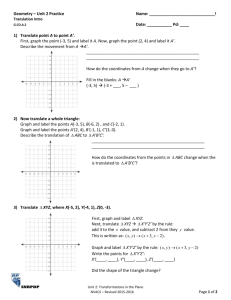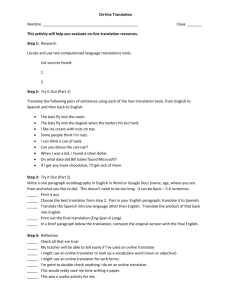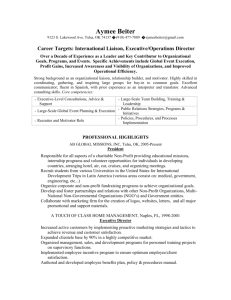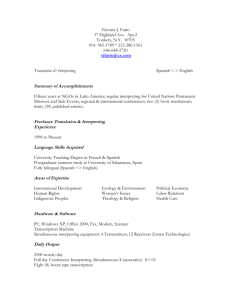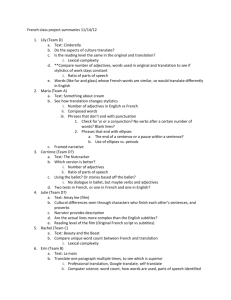Questionnaire for face-to-face use VERSION FOR SLOVENIA AND
advertisement
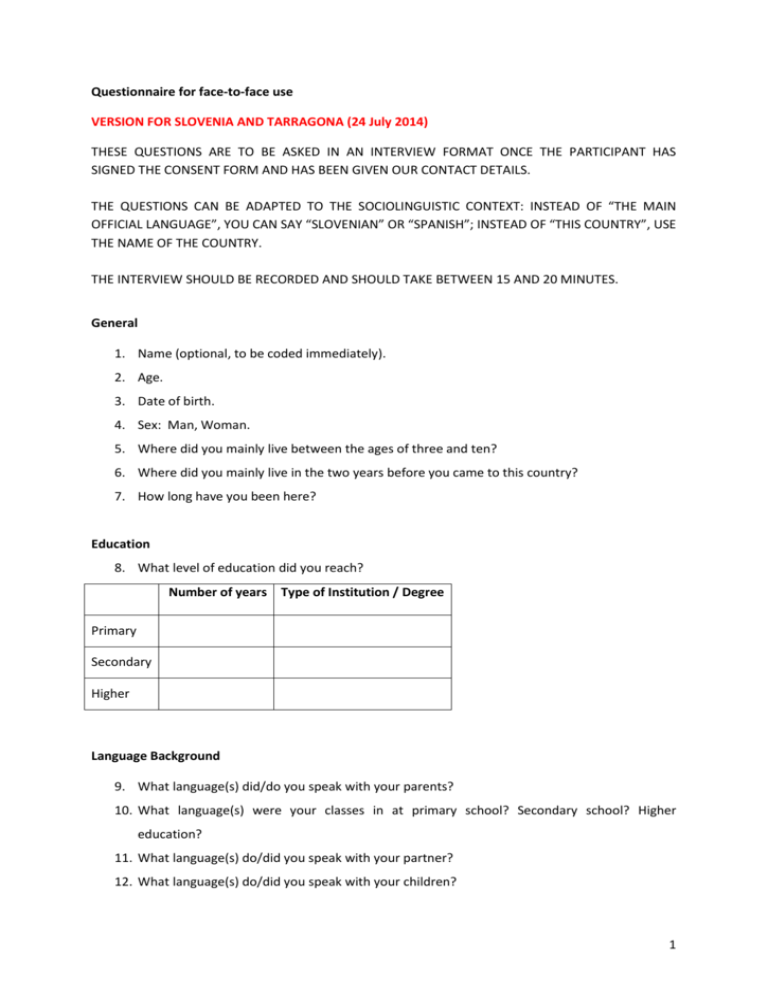
Questionnaire for face-to-face use VERSION FOR SLOVENIA AND TARRAGONA (24 July 2014) THESE QUESTIONS ARE TO BE ASKED IN AN INTERVIEW FORMAT ONCE THE PARTICIPANT HAS SIGNED THE CONSENT FORM AND HAS BEEN GIVEN OUR CONTACT DETAILS. THE QUESTIONS CAN BE ADAPTED TO THE SOCIOLINGUISTIC CONTEXT: INSTEAD OF “THE MAIN OFFICIAL LANGUAGE”, YOU CAN SAY “SLOVENIAN” OR “SPANISH”; INSTEAD OF “THIS COUNTRY”, USE THE NAME OF THE COUNTRY. THE INTERVIEW SHOULD BE RECORDED AND SHOULD TAKE BETWEEN 15 AND 20 MINUTES. General 1. Name (optional, to be coded immediately). 2. Age. 3. Date of birth. 4. Sex: Man, Woman. 5. Where did you mainly live between the ages of three and ten? 6. Where did you mainly live in the two years before you came to this country? 7. How long have you been here? Education 8. What level of education did you reach? Number of years Type of Institution / Degree Primary Secondary Higher Language Background 9. What language(s) did/do you speak with your parents? 10. What language(s) were your classes in at primary school? Secondary school? Higher education? 11. What language(s) do/did you speak with your partner? 12. What language(s) do/did you speak with your children? 1 13. What language(s) did you mainly speak at work in your homeland? 14. What language(s) do/did you read religious texts or pray in? 15. What language(s) do you watch television in? a. Which of these do you prefer? 16. Which language(s) would you like to watch television in? 17. What language(s) do you use the Internet in? a. Which of these do you prefer? 18. Which language would you define as your mother tongue? 19. Which language do you feel most confortable using? 20. Do you speak any other languages? 21. Did you learn foreign languages at school? a. If so, which and when? 22. How would you rate your proficiency in the languages you use? Listening Speaking Reading Writing 1 Poor L1: 2 L2: 3 L3: 4 L4: 5 Excellent L5: 23. Are there any languages you understand but are reluctant to use? a. If so, why? 24. Are there any languages you would never learn, even if the lessons were free? a. If so, why? 25. What do you like most about your preferred languages? 26. When you have language problems in this country, what do you usually do? Never 2 3 4 Always Speak English or French. You speak one language and the other person speaks a different language that you understand well enough. Look for someone to interpret or translate. Get a translation from an electronic tool or the Internet. Try to speak the main language of this country, even if you do not know it well. 2 Use of Interpreting / Translation Services 27. Do you require or have you required translation or interpreting services (e.g. when dealing with doctors, government services, lawyers)? a. If so, when did you use the services and what for? 28. Who does/did the translation or interpreting for you? A family member or friend (AGE, SEX, RELATION) who speaks: A PROFESSIONAL interpreter who speaks: Another person ( ) Details: 29. If you seek/sought interpreting services, which language/s do you normally ask for? a. Why? 30. Have you ever formally requested written translations of information in this country? 31. If you seek/sought written translations of information in this country, which language do you normally ask for and why? 32. Do you or have you interpreted or translated for others? a. If so, where, when and why? b. What languages did you translate between? c. In which directions? Language Attitudes 33. Do you think it is important to know the language of the country where you live? a. If so, why? 34. Is there one language that you think is more useful to you than other languages when you are in this country? a. If so, why? 35. Since your arrival in this country, have you taken any free lessons in the main official language(s)? a. Do you wish to take free lessons? 36. If so, how do you imagine your life would be different if you spoke this country’s main language? 37. Have you taken any other language courses since your arrival here? a. Why? 38. What languages other than the main one here would you like to learn? a. Why? b. How do you imagine your life would be different if you spoke those languages? 39. Which would you prefer to do over the next three years: learn this country’s main language, 3 to learn English or French, or to use skilled interpreters and/or translators? 40. If you had the opportunity to use an interpreter in all your official dealings with the administration here, would you still be interested in learning the main language here? a. Why? Use of Translation Technologies 41. Do you ever use the Internet to obtain information in this country? a. If so, in which languages are the sites that you visit? 42. Have you ever used Google Translate or other translation tools? a. Which tools? b. What kind of sites did you use them for (e.g. information about doctors, government offices, lawyers)? c. Which languages did you translate from/into using the tools? Languages in Context 43. In what situations, if any, (e.g. dealing with doctors, government offices, lawyers, everyday life) have you used online technologies (e.g. Google Translate)? a. Why? b. Which languages do you normally use? 44. In what situations, if any, (e.g. dealing with doctors, government offices, lawyers, everyday life, etc.) do you not use interpreting/translation and instead use one of your languages? a. Why? b. Which languages do you normally use? Other 45. Please feel free to add anything else in relation to your use of languages in this country. 4
